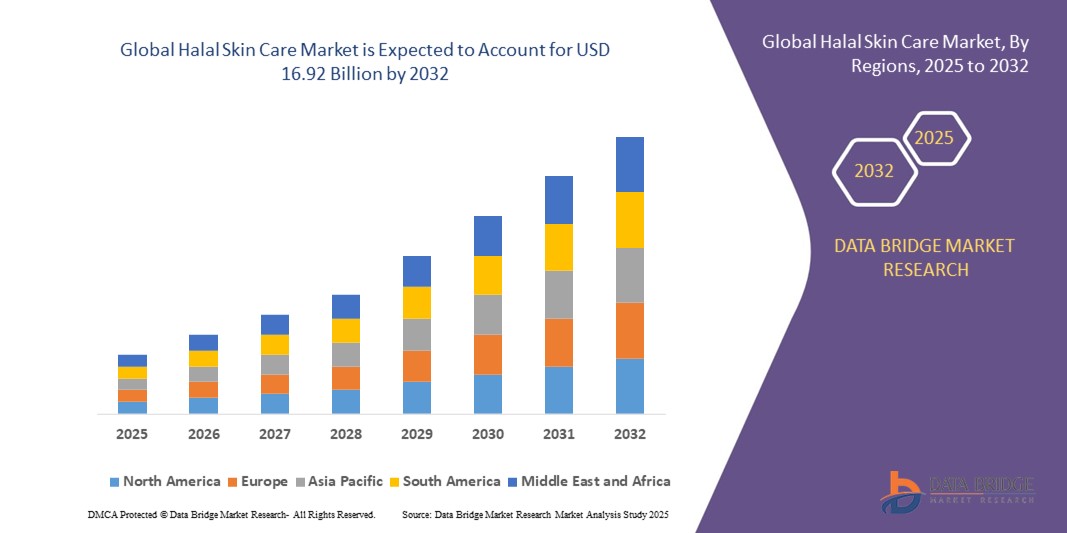Global Halal Skin Care Market
市场规模(十亿美元)
CAGR :
% 
 USD
11.80 Billion
USD
16.92 Billion
2024
2032
USD
11.80 Billion
USD
16.92 Billion
2024
2032
| 2025 –2032 | |
| USD 11.80 Billion | |
| USD 16.92 Billion | |
|
|
|
|
全球清真護膚品市場細分,按產品(個人護理、皮膚護理、頭髮護理、彩妝、面部、眼部、唇部、指甲和香水)、應用(頭髮護理、皮膚護理、美容護理、面部護理和其他)、分銷渠道(頭髮護理、皮膚護理、美容護理、面部護理和其他) - 行業趨勢和預測到 2032 年
清真保養品市場規模
- 2024 年全球清真保養品市場規模為118 億美元,預計到 2032 年將達到 169.2 億美元,預測期內 複合年增長率為 4.6%。
- 市場成長主要源自於消費者對符合道德、天然且宗教信仰的美容產品的日益增長的偏好,而清真認證正逐漸成為護膚品和化妝品領域的關鍵差異化因素。隨著消費者對有害化學物質、動物性成分和零殘忍實踐的認識不斷提高,全球市場對清真認證解決方案的需求也不斷增強。
- 此外,透過電商平台、專賣店和主流零售連鎖店,清真認證護膚品的供應日益增多,也加速了清真護膚品的普及。注重健康的購買習慣、文化契合度以及對清真認證的監管支持,這些因素共同推動了清真護膚品產業的擴張。
清真護膚品市場分析
- 清真護膚產品經認證,不含酒精、動物副產品和刺激性化學物質,旨在符合宗教原則和現代清潔美容標準。這些產品包括保濕霜、精華液、潔面乳和化妝品,吸引尋求安全且符合道德標準的穆斯林和非穆斯林消費者。
- 清真護膚品需求的不斷增長,主要源於可支配收入的提高、城市人口的增長以及消費者對可持續和透明美容的日益追求。清真認證的保障,加上社群媒體的影響力、網紅行銷以及全球清真品牌的擴張,使得清真護膚品在化妝品產業中迅速發展成為一個成長迅速的細分領域。
- 2024 年,中東和非洲佔據了清真護膚品市場的主導地位,因為對經過認證的清真美容和個人護理產品的需求很高,而且消費者對符合道德和宗教要求的配方的偏好也越來越高
- 由於城市化進程加快、可支配收入增加以及馬來西亞、印尼和新加坡等國家對經過認證的清真美容產品的偏好日益增加,預計亞太地區將成為預測期內清真護膚市場成長最快的地區
- 由於消費者對符合道德和清潔美容產品的認識不斷提高,護膚品領域在2024年佔據了39%的市場份額,佔據了市場主導地位。消費者對保濕霜、精華液和臉部護理產品中天然、無動物實驗和無化學成分的偏好日益增長,刺激了需求。獲得清真認證的護膚產品能夠保證其純度並符合伊斯蘭教義,吸引了穆斯林消費者和有意識的非穆斯林消費者。電商平台的蓬勃發展,加上創新產品的推出和網紅行銷,進一步推動了全球對清真護膚產品的接受度。
報告範圍和清真護膚品市場細分
|
屬性 |
清真護膚品關鍵市場洞察 |
|
涵蓋的領域 |
|
|
覆蓋國家 |
北美洲
歐洲
亞太
中東和非洲
南美洲
|
|
主要市場參與者 |
|
|
市場機會 |
|
|
加值資料資訊集 |
除了對市場價值、成長率、細分、地理覆蓋範圍和主要參與者等市場情景的洞察之外,Data Bridge Market Research 策劃的市場報告還包括深入的專家分析、定價分析、品牌份額分析、消費者調查、人口統計分析、供應鏈分析、價值鏈分析、原材料/消耗品概述、供應商選擇標準、PESTLE 分析、波特分析和監管框架。 |
清真保養品市場趨勢
皮膚健康和安全標準意識的提高
- 隨著消費者對皮膚健康的意識不斷增強以及安全標準的不斷提高,清真護膚品市場正在強勁增長。消費者越來越多地選擇不含有害化學物質、酒精和動物性成分的產品,這些產品符合監管基準和宗教規範,同時滿足皮膚病學安全要求。
- 例如,Wardah 和 IBA Halal Care 透過提供符合伊斯蘭教法原則的安全、無酒精、無動物實驗的產品,在清真護膚領域佔據了穩固的地位,同時也吸引了尋求無毒且符合道德標準的化妝品的廣大消費者。同樣,聯合利華等跨國公司也在擴大其清真認證產品線,以滿足亞太地區和中東地區日益增長的需求。
- 清潔標籤護膚品的流行趨勢增強了清真認證作為產品純度、安全性和透明度標誌的吸引力。消費者對標籤和成分的嚴格審查,直接提升了穆斯林和非穆斯林群體對清真護膚品牌的信任和偏好。
- 與污染、荷爾蒙失調和生活方式改變相關的皮膚問題發病率不斷上升,也增加了對確保皮膚安全的產品的需求。清真配方越來越多地被定位為比化學成分密集型化妝品更溫和、更安全的替代品,進一步擴大了其在敏感肌膚類別中的應用。
- 總而言之,對皮膚健康的認識不斷提高以及安全標準的重要性直接影響著消費者的選擇,確保清真認證的護膚品能夠繼續在各個人口和地區獲得可持續的吸引力。
清真保養品市場動態驅動因素
對符合道德和清真認證產品的需求不斷增加
- 消費者對符合道德、透明且獲得清真認證的產品的需求不斷增長,這是清真護膚市場發展的關鍵驅動力。清真認證確保產品符合宗教價值和全球道德標準,從而吸引尋求安全、無殘忍且環保選擇的多元化消費者群體。
- 例如,Amara Halal Cosmetics 專注於清真認證、純素和無毒產品,在北美市場聲名鵲起,吸引了穆斯林以外的有意識的消費者。同樣,Wardah 和 Safi 也擴大了其清真認證產品的供應規模,將道德採購、永續實踐與宗教合規性結合。
- 更廣泛的道德消費主義趨勢正在推動製造商提供符合永續發展實踐的護膚產品,例如零殘忍測試、環保包裝和天然有機配方。清真認證是品質、安全和道德責任的額外保證。
- 清真美容與更廣泛的道德消費運動的結合大大拓寬了潛在市場
- 它將清真護膚品定位為小眾宗教產品和主流道德選擇,吸引全球注重健康、注重永續發展的消費者
克制/挑戰
來自知名品牌的競爭
- 清真護膚品市場面臨的一大挑戰是來自全球知名美容和個人護理品牌的激烈競爭。知名跨國公司已經佔據了貨架空間、分銷管道和行銷預算的主導地位,這使得規模較小的清真品牌難以在全球範圍內獲得知名度和規模。
- 例如,歐萊雅和寶潔等全球巨頭正越來越多地將天然和「清潔美容」產品線整合到其現有產品組合中。雖然這些產品並非總是獲得清真認證,但它們透過滿足消費者對安全、零殘忍和零化學產品的需求而直接競爭,從而限制了清真品牌在主流市場的差異化。
- 激烈的競爭也會影響定價策略。大型跨國公司受益於規模經濟,能夠提供具有競爭力的定價和廣泛的促銷活動,而專注於清真食品的小型品牌往往無法比擬。這減少了在清真意識尚在發展的非傳統市場的成長機會。
- 此外,成熟的國際品牌通常享有更高的消費者信任度、廣泛的全球零售網路和先進的研發投入。這為新興清真品牌設定了進入門檻,這些品牌必須在與成熟的市場領導者競爭的同時,讓消費者相信其合法性、功效和價值。
- 因此,來自知名美容護膚品牌的競爭仍然是一個結構性挑戰。清真企業需要強調強而有力的認證、品牌真實性、有針對性的宣傳活動和產品創新,以在競爭激烈的市場環境中脫穎而出,確保長期成長。
清真護膚品市場範圍
市場根據產品、應用和分銷管道進行細分。
- 按產品
根據產品類型,清真護膚市場細分為個人護理、皮膚護理、頭髮護理、彩妝、面部護理、眼部護理、唇部護理、指甲護理和香水。 2024年,保養品佔據市場主導地位,收入份額最高,達39%,這得益於消費者對符合道德和清潔美容產品的認知度不斷提升。消費者對保濕霜、精華液和臉部護理產品中天然、無動物實驗和無化學成分的偏好日益增長,刺激了市場需求。獲得清真認證的護膚產品能夠確保產品的純度並符合伊斯蘭教義,吸引了許多穆斯林消費者和有清真意識的非穆斯林消費者。電商平台的蓬勃發展,加上創新產品的推出和網紅行銷,進一步推動了全球對清真護膚產品的採用。
預計個人護理領域將在2025年至2032年間實現最快的成長,這得益於消費者對全面清真認證護理程序的日益青睞。沐浴露、除臭劑和乳液等產品因其符合道德規範的配方和對敏感肌膚的兼容性而日益受到歡迎。社群媒體的影響力日益增強,以及對符合道德、可持續和注重健康的生活方式的產品的需求不斷增長,正在加速市場滲透。個人護理用品也正成為各大品牌拓展清真認證產品組合、以吸引更廣大群眾的重點關注對象。
- 按應用
根據應用領域,清真護膚市場細分為護髮、護膚、美容護理、臉部護理及其他。 2024年,護膚應用領域佔了最大的市場收入份額,這歸因於消費者越來越重視符合清真標準的日常護膚程序。人們對傳統護膚品中有害化學物質和合成成分的擔憂日益加劇,這增強了人們對經過清真認證的替代品的偏好。城市化進程的加快、可支配收入的增加以及健康趨勢的影響也在推動清真產品的普及,尤其是在千禧世代和Z世代消費者中。經清真認證的面膜、乳霜和精華液因其符合道德標準的採購和溫和的配方而日益受到認可,進一步鞏固了其市場主導地位。
預計2025年至2032年,美容護理領域將迎來最快的複合年增長率,這得益於清真產品在彩妝、去角質產品和水療護理領域的日益普及。消費者正在尋求既能提升容貌,又符合宗教、道德和清潔標籤標準的產品。線上美妝平台、社群媒體推廣以及網紅推廣活動的激增,正在加速清真美容護理產品的普及。此外,人們對配方包容性和多樣性的日益關注,也促使各大品牌在這一應用領域拓展其清真認證產品。
- 按分銷管道
根據分銷管道,清真護膚品市場可細分為大型超市、專賣店、線上零售及其他。 2024年,線上零售佔據市場主導地位,這得益於送貨上門的便利性、豐富的產品種類以及獲得清真認證品牌的便捷性。電子商務的普及率激增,尤其是在新興市場,使得線上平台成為精通科技且注重清真認證的消費者的首選。這些平台上詳盡的產品資訊、用戶評價以及便捷的清真認證比較,進一步增強了消費者信心,並推動了購買。
預計2025年至2032年,專賣店細分市場將迎來最快的成長,這得益於消費者對精選清真護膚系列和專家推薦的需求不斷增長。專賣店提供個人化體驗、專業指導以及獨家銷售清真認證小眾產品。日益增多的品牌合作、快閃活動和店內推廣活動正在促進成長,而消費者對購買前進行實體產品試用的偏好也將繼續鞏固這一管道。專業知識、真實性和精選產品的結合,使專賣店成為高成長的分銷管道。
清真護膚品市場區域分析
- 中東和非洲在 2024 年佔據清真護膚品市場主導地位,收入份額最大,這得益於對經過認證的清真美容和個人護理產品的需求旺盛,以及消費者對符合道德和宗教要求的配方的偏好日益增加
- 該地區的消費者高度重視清真認證的保證、天然和無殘忍成分,以及針對敏感肌膚量身訂製的產品
- 可支配收入的增加、人們對清真生活方式產品的認識不斷提高以及強大的零售和電子商務基礎設施進一步支持了清真護膚品的廣泛採用,使清真護膚品成為整個地區的首選
阿聯酋清真護膚品市場洞察
2024年,阿聯酋佔據了中東和非洲地區最大的收入份額,這得益於其強勁的零售業、高可支配收入以及大量積極尋求清真認證護膚品和個人護理產品的民眾。消費者優先考慮優質、符合道德規範且天然的配方,而國際清真認證品牌的存在則增強了市場的多樣性。線上平台的普及,加上網紅行銷和奢華美容趨勢,進一步加速了清真護膚品在個人和專業領域的普及。
歐洲清真保養品市場洞察
受多元文化人口成長以及對符合道德規範的清潔美容產品需求不斷增長的推動,歐洲清真護膚品市場預計將在預測期內實現顯著的複合年增長率。由於英國和德國等國家對成分安全、永續性和零殘忍標準的認識不斷提高,清真認證的護膚品和個人護理產品正在被廣泛採用。零售商和專賣店越來越多地提供清真認證產品,而電商平台的擴張也進一步提升了其覆蓋多元化消費者群體的可及性。
英國清真保養品市場洞察
英國清真護膚品市場預計在預測期內將實現顯著的複合年增長率,這主要得益於消費者對符合道德、透明且符合宗教信仰的個人護理產品的需求。清真認證意識的不斷提升,以及健康、保健和美容趨勢的日益增長,正促使零售商和品牌拓展其清真產品供應。強勁的電商基礎設施和日益普及的線上美妝平台預計將繼續支撐市場成長。
德國清真保養品市場洞察
預計在預測期內,德國清真護膚品市場將以可觀的複合年增長率擴張,這得益於消費者對清潔、天然和清真認證產品的認知度不斷提升。德國發達的零售網絡,加上對符合道德、可持續和純素美容產品日益增長的需求,推動了市場的普及。專賣店、有機商店和線上平台的日益普及,也促進了清真護膚解決方案在個人護理和專業護理領域的滲透。
亞太清真保養品市場洞察
受城鎮化進程加快、可支配收入成長以及馬來西亞、印尼和新加坡等國對經過認證的清真美容產品日益增長的推動,亞太地區清真護膚品市場預計將在預測期內實現最快的複合年增長率。該地區強大的清真認證框架,加上消費者對清潔和符合道德規範配方的日益重視,正在加速清真護膚品的普及。政府推動清真產業發展的舉措,以及電子商務和社群媒體行銷的蓬勃發展,正在提升產品在更廣泛消費者群體中的知名度和可及性。
日本清真保養品市場洞察
由於消費者對天然、符合倫理道德且清潔的美容產品的興趣日益濃厚,日本清真護膚品市場正在穩步增長。清真認證的護膚品越來越受到注重健康的穆斯林消費者的追捧。清真產品融入高端護膚品系列,加上健康潮流的影響和線上購物平台的普及,正在推動市場擴張。日本消費者對高品質、安全有效配方的偏好,進一步推動了清真保養品的普及。
中國清真護膚品市場洞察
2024年,中國清真護膚品市場佔據亞太地區最大收入份額,這得益於城鎮化進程加快、可支配收入增加以及清潔和道德美容產品的廣泛普及。中產階級人口的不斷增長,加上人們對清真認證產品的認知度不斷提升,正在推動護膚、個人護理和美容領域的需求。線上零售平台的擴張以及網紅主導的行銷活動,進一步加速了清真護膚品在全國各地的知名度和普及度。
清真護膚品市場份額
清真護膚品產業主要由知名公司主導,其中包括:
- 瓦爾達(印尼)
- TNS 皮膚實驗室(馬來西亞)
- 米斯克·阿爾法茲(沙烏地阿拉伯)
- Al Haramain 香水公司(阿聯酋)
- Suna Natural SL(土耳其)
- 滋養倫敦(英國)
- Ibtissam Beauty(美國)
- Sudsatorium(澳洲)
- 草藥與香精(孟加拉)
- Juicy Chemistry 由 Shopify 提供支援(印度)
全球清真護膚品市場的最新發展
- 2022年11月,Iba Cosmetics與總部位於新加坡的Believe Company達成合作,旨在加強其分銷網絡,並擴大其在中東、歐洲和南亞地區的市場影響力。此次合作承諾投資100億美元,預計將加速Iba Cosmetics的全球佈局,使Halal認證產品在關鍵成長市場更廣泛普及。此次合作增強了Iba的物流和零售能力,並增強了消費者對Halal認證產品的信心,從而支持其在對符合道德和宗教信仰的美容解決方案需求旺盛的地區的長期增長。
- 2022年4月,Inika Organic推出了全新彩妝系列Pure with Purpose,其中包括睫毛眉毛精華液、保濕爽膚噴霧、四色眼影和眉筆調色板。該系列產品以100%天然、純素認證、清真認證和零殘忍為賣點,順應了全球日益增長的清潔、可持續和道德美容趨勢。此次發布鞏固了Inika Organic在高端清真護膚和化妝品領域的領先地位,同時滿足了消費者對透明度、安全性和多功能美妝解決方案的需求。該計劃還凸顯了品牌如何利用認證,將其吸引力從穆斯林消費者擴展到更廣泛的道德意識的受眾。
- 2022年9月,韓國清真化妝品製造商韓國科瑪株式會社(Kolmar Korea Co.)宣布計畫擴大在阿聯酋的業務,供應清真認證產品。此次策略擴張旨在進軍中東快速成長的清真美容市場,該市場的特點是消費者高度集中,積極尋求經過認證、安全且優質的產品。透過在阿聯酋建立業務,韓國科瑪提升了其在該地區的知名度和品牌認知度,並順應了清真認證作為競爭激烈的國際市場關鍵差異化因素的全球趨勢。
- 2021年10月,總部位於杜拜的化妝品品牌Mikyajy推出了包含口紅在內的清真認證化妝品系列,以應對新冠疫情,這加劇了消費者對衛生和產品安全的關注。推出可持續且衛生的清真產品,使Mikyajy能夠滿足消費者日益增長的對符合道德規範且可靠的美容解決方案的期望。這項措施鞏固了Mikyajy在中東清真化妝品領域的地位,同時也強調了整合健康、永續性和認證標準以贏得消費者信任的重要性。
- 2021年8月,日本花王株式會社與獅王株式會社合作,為其獲得清真認證的化妝品開發可回收包裝,旨在減少對環境的影響並最大限度地減少塑膠垃圾。這項措施凸顯了永續性與清真合規性的融合,吸引了全球環保意識的消費者。透過將道德美容標準與環保實踐相結合,花王株式會社將自身定位為負責任化妝品製造領域的領導者,提升了品牌價值,並支持國內外市場長期採用清真認證產品。
SKU-
Get online access to the report on the World's First Market Intelligence Cloud
- Interactive Data Analysis Dashboard
- Company Analysis Dashboard for high growth potential opportunities
- Research Analyst Access for customization & queries
- Competitor Analysis with Interactive dashboard
- Latest News, Updates & Trend analysis
- Harness the Power of Benchmark Analysis for Comprehensive Competitor Tracking
研究方法
数据收集和基准年分析是使用具有大样本量的数据收集模块完成的。该阶段包括通过各种来源和策略获取市场信息或相关数据。它包括提前检查和规划从过去获得的所有数据。它同样包括检查不同信息源中出现的信息不一致。使用市场统计和连贯模型分析和估计市场数据。此外,市场份额分析和关键趋势分析是市场报告中的主要成功因素。要了解更多信息,请请求分析师致电或下拉您的询问。
DBMR 研究团队使用的关键研究方法是数据三角测量,其中包括数据挖掘、数据变量对市场影响的分析和主要(行业专家)验证。数据模型包括供应商定位网格、市场时间线分析、市场概览和指南、公司定位网格、专利分析、定价分析、公司市场份额分析、测量标准、全球与区域和供应商份额分析。要了解有关研究方法的更多信息,请向我们的行业专家咨询。
可定制
Data Bridge Market Research 是高级形成性研究领域的领导者。我们为向现有和新客户提供符合其目标的数据和分析而感到自豪。报告可定制,包括目标品牌的价格趋势分析、了解其他国家的市场(索取国家列表)、临床试验结果数据、文献综述、翻新市场和产品基础分析。目标竞争对手的市场分析可以从基于技术的分析到市场组合策略进行分析。我们可以按照您所需的格式和数据样式添加您需要的任意数量的竞争对手数据。我们的分析师团队还可以为您提供原始 Excel 文件数据透视表(事实手册)中的数据,或者可以帮助您根据报告中的数据集创建演示文稿。














